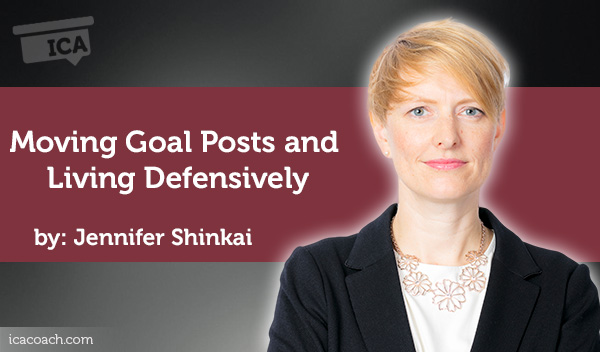
Coaching Case Study By Jennifer Shinkai
(Executive Coach, JAPAN)
1. Who are the main players in this case study
E W, single mom to a toddler, repatriated from Asia to her hometown
2. What is the core problem or challenge you applied your coaching skills to?
Self limiting beliefs
Assumptions about success
Why is it a problem?
She is torn between providing stability for her son as a single mum and doing work that makes her feel successful and energised
How long has it been a problem?
At least 3 years since she became pregnant but probably longer as she often felt pigeonholed when living alone in Asia
What is the worst thing about this problem?
She feels not in control, that she is letting self down, that she is “Living defensively” and she is ashamed of that. She wants to be someone who can say “I want that and I am going to have it”
Why has no one been able to solve it so far?
First time to explore self in this way
2. What specific coaching skills or approach did you use in this case?
3. Explain your process in detail
4 sessions via skype between Oct 25 and Jan 25 – 3 months
I felt that I started well with a discovery session that suggested we were going to be doing a career change exploration. However, between each session (3-4 weeks) the client changed her focus in her career
1. Be an office worker
2. Start a consulting company
3. Be a freelance translator
4. Take a low level govt job to get foot in the door for security.
I used the Schien’s Career Anchor Tool as a starting data point but did not refer back to it more after the first session.
We used the grow model but the most interesting revelations for the clients came around
Many times when the client made a strong judgement or blanket generalisation I would ask her “What if that were not true?”
For the third session I asked her the following questions via email. I felt these were quite useful tools to look at underlying beliefs but I’m not sure I followed up well enough:
The classic approach to opening yourself up is looking at the “can’ts” -are they true? What is the outcome of taking the opposite approach?
Also how has living defensively helped you? (therefore working out what might stop you from doing the opposite)
Let’s talk about what living offensively would look like, feel like and what steps you could take to arrive at that future state. Question every time you say “all, everything, everyone”
Gave the client a useful tool as she had a tendency to slam the breaks on her ideas when they sounded like a lot of work or commitment. “How could you make it really simple?”
4. What were the results of your process? Was your coaching/program effective? Why? Why not?
I think the four sessions length was not that effective as we didn’t really work on deeper level and only now looking back through my notes do I see the real trends that led the shift in focus.
The focus kept shifting and I was keen to allow sessions to be lead by client. However, I wonder if she needed more structure. I wonder if I was too sympathetic of her personal situation (she needs to be stable as a single mum) when I could have challenged her to see if she could create a life of both meaningful work and financial stability.
The feedback from the client was:
5. If you could approach this problem again, what would you do differently?
1. Questioning assumptions and underlying beliefs – what could client do outside session to get traction
2. Coaching agreement – We are shifting from the initial focus and moving into another area. What is behind that?
3. Review notes more carefully and bring ideas to the session about possible themes to discuss.
4. Study more about Byron Katie’s The work to get some powerful questions for addressing underlying belief
6. What are the top 3 things you learnt from this experience?
Coaching Agreement needs to be crystal clear and refer to it if you feel that you are going off track over multiple sessions.
When Clients are looking for validation – Do you think I should xxxx? It can be helpful to say “If you do xxxx, how will it support your goal?”
That the initial problem a client comes to you with may shift dramatically – don’t be disappointed that you could not provide a magic bullet in 4 sessions to underlying beliefs shaped over 40 years of experiences.
Questions to ICA classmates:
How have you managed moving goalposts with clients?
How do you try to be objective – Coach the client not the situation? I felt sometimes I did not challenge her enough.
What models have you used to work on underlying beliefs? Esp ones about self worth.